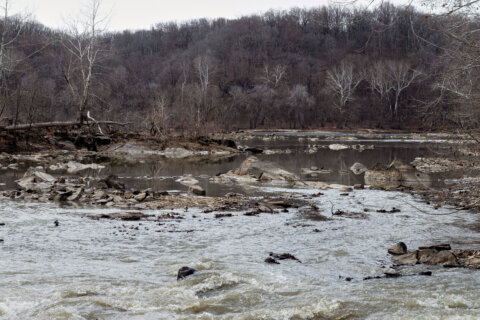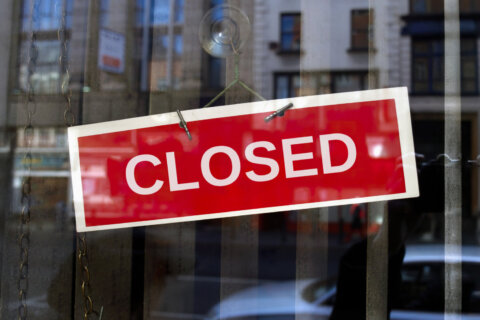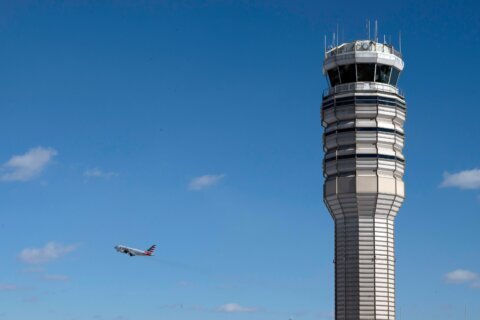KEARNEYSVILLE, W.Va. — Less than a month after breaking ground and throwing shovels of dirt at a bucolic former apple orchard, the president of a Denmark-based home insulation manufacturer admits he was surprised by the uproar from residents concerned about pollution.
“Everyone knows there’s been a lot of discussion in the community about this factory over the last couple of weeks,” said Trent Ogilvie, president of Rockwool’s insulation business in North America. The company runs 45 factories in 39 countries, including three in Canada, and one in Byhalia, Mississippi.
As WTOP has reported, word that a 24-hour-a-day factory is being built in Ranson, just off Route 9, where rocks will be melted into molten lava in the manufacturing of stone wool insulation, has raised fears among neighbors worried about what will spew from the factory’s stacks — with one being 21 stories high.
In a company office, located in an office park, a few miles from the former Jefferson Orchards, where heavy machinery has been readying the land for the construction of the factory, Ogilvie said he’s not sure what fueled the ongoing furor in Jefferson County, which borders Loudoun County, Virginia.
“We respect the fact that there’s questions, and want to address as many as we can,” said Ogilvie. “I also want to say we are accelerating that (community relations) effort.”
With more than 5,000 members, a Facebook group called Citizens Concerned About Rockwool — Ranson, WV, residents have decried the company, Jefferson County and city of Ranson elected officials, the West Virginia Department of Environmental Protection and the news media for failing to inform them about the scope of the factory.
Some posters have vowed to move if the factory is built, others are hoping political pressure, or possibly legal action, can stop the Rockwool plant from being completed.
Ogilve points to the Rockwool factory in Mississippi as proof that emissions from the plant will not hurt the community.
“There is absolutely zero violations for the air permits that exist, zero odor, zero noise complaints, and a community that’s very supportive of us and the economic benefits that we bring,” said Ogilvie. “We’re not harming the communities or the people where we operate.”
Critics of the factory have said the federal Environmental Protection Agency’s Clean Air Act isn’t stringent enough to ensure the safety of children in four schools within a couple miles of the plant.
“The levels that actually are emitted, measuring at our fence line, are well, well below any standards relating to people with asthma, children, animals, and crops, so no, we don’t think there’s any (safety) concern,” said Ogilvie. “If you go outside our fence line, toward schools or elsewhere in the community, it’s obviously much, much lower.”
Not satisfied with meeting minimum legal requirements, some in the neighborhood have suggested real-time air monitoring at local schools. One school — North Jefferson Elementary School — sits several hundred yards across Route 9 from the plant site. Ogilvie was open to the idea.
“I think we’re going to take that under advisement, and see can we put some monitoring stations up, for now and after,” said Ogilvie. “Without committing to you, I think it’s a good suggestion.”
Residents have expressed fears about how the Rockwool factory will affect air quality and visibility in nearby Harper’s Ferry, as well as Loudoun County’s vineyards.
“You can see the factory. You can see what it looks like. It has stacks. But it doesn’t operate with any visible plume,” Ogilvie said.
One item that has fueled neighbors outrage and concern was the factory’s Air Quality Permit Notice — posted the day before Thanksgiving 2017 — which listed hundreds of tons of air pollutants which the company expects will be released from its stacks.
In the wake of residents feeling blindsided by the reality that tons of pollutants — some carcinogenic — will be emitted, Ogilvie said a priority of the company will be answering questions about air safety, starting with a company open house, on Aug. 25.
“So people can really understand how little impact there is to ozone levels — it’s not measurable from our factory, and the same for formaldehyde and some of the other emissions — so we will put that in front of the public in a very detailed way.”
With the company investing $150 million in the factory in cash-strapped West Virginia, and the promise of at least 150 jobs, as other neighbors seek to stop the factory in its tracks, Ogilvie acknowledged some will continue to fight Rockwool.
“I doubt there’s anything we’re going to do to change that,” Ogilvie said. “But, we think the majority will understand, as we talk about improving and increasing our communication, we hope that those concerns (about air quality safety) and that desire to not have the factory will go away.”
Many in Jefferson County — the most affluent county in one of America’s poorest states — bristle at the suggestion that heavy industry, and the environmental risk it brings, is beneficial to the community.
Despite the ongoing challenges, the targeted opening date for the Rockwool factory remains the first quarter of 2020.








